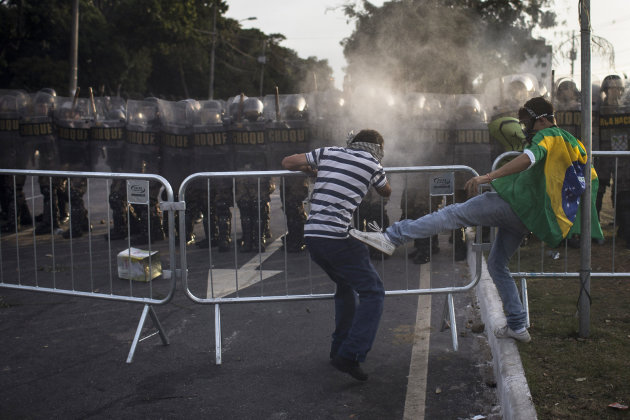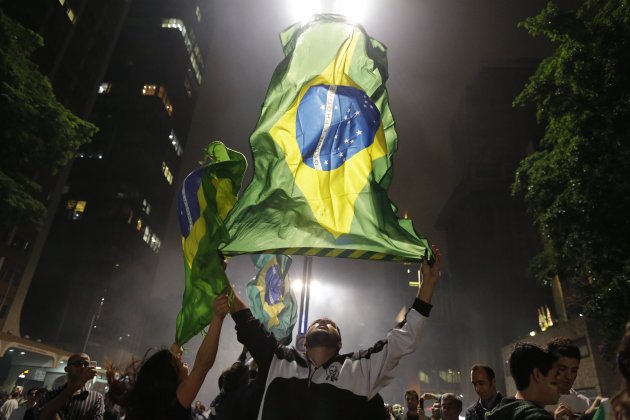
By
SAO PAULO (AP) — More than 250,000 anti-government
demonstrators again took to streets in several Brazilian cities Saturday
and engaged police in some isolated, intense conflicts. Anger over
political corruption emerged as the unifying issue for the
demonstrators, who vowed to stay in the streets until concrete steps are
taken to reform the political system.
Across Brazil,
protesters gathered to denounce legislation, known as PEC 37, that
would limit the power of federal prosecutors to investigate crimes —
which many fear would hinder attempts to jail corrupt politicians.Federal prosecutors were behind the investigation into the biggest corruption case in Brazil's history, the so-called "mensalao" cash-for-votes scheme that came to light in 2005 and involved top aides of former President Luiz Inacio Lula da Silva buying off members of congress to vote for their legislation.
Last year, the supreme court condemned two dozen people in connection to the case, which was hailed as a watershed moment in Brazil's fight against corruption. However, those condemned have yet to be jailed because of appeals, a delay that has enraged Brazilians.
The protests continued despite a prime-time speech the night before from President Dilma Rousseff,
a former leftist guerrilla who was tortured during Brazil's military
dictatorship. She tried to appease demonstrators by reiterating that
peaceful protests were a welcome, democratic action and emphasizing that
she would not condone corruption in her government.
"Dilma is underestimating the
resolve of the people on the corruption issue," said Mayara Fernandes, a
medical student who took part in a march Saturday in Sao Paulo. "She talked and talked and said nothing. Nobody can take the corruption of this country anymore."
The wave of protests began as opposition to transportation fare
hikes, then became a laundry list of causes including anger at high
taxes, poor services and high World Cup spending, before coalescing
around the issue of rampant government corruption. They have become the
largest public demonstrations Latin America's biggest nation has seen in
two decades.
Across Brazil, police estimated that about 60,000 demonstrators gathered in a central square in the city of Belo Horizonte,
30,000 shut down a main business avenue in Sao Paulo, and another
30,000 gathered in the city in southern Brazil where a nightclub fire
killed over 240 mostly university students, deaths many argued could
have been avoided with better government oversight of fire laws. Tens of
thousands more protested in more than 100 Brazilian cities, bringing
the nationwide total to 250,000, according to a police count published
on the website of the Globo TV network, Brazil's largest.
During her pre-recorded TV speech, Rousseff promised that she would always battle corruption and that she would meet with peaceful protesters, governors and the mayors of big cities to create a national plan to improve urban transportation and use oil royalties for investments in education.
Many Brazilians, shocked by a week of protests and violence, hoped that Rousseff's words after several days of silence from the leader would soothe tensions and help avoid more violence, but not all were convinced by her promises of action.
Victoria Villela, a 21-year-old university student in the Sao Paulo protest, said she was "frustrated and exhausted by the endless corruption of our government."
"It was good Dilma spoke, but this movement has moved too far, there was not much she could really say. All my friends were talking on Facebook about how she said nothing that satisfied them. I think the protests are going to continue for a long time and the crowds will still be huge."
Around her, fathers held young boys aloft on their shoulders, older women gathered in clusters with their faces bearing yellow and green stripes, the colors of Brazil's flag.
In the northeastern city of Salvador, where Brazil's national football team played Italy and won 4-2 in a Confederations Cup match, some 5,000 protesters gathered about 3 miles (5 kilometers) from the stadium, shouting demands for better schools and transportation and denouncing heavy spending on next year's World Cup.
They blocked a main road and clashed with riot police who moved in to clear the street. Protesters said police used rubber bullets and even tossed tear gas canisters from a helicopter hovering overhead. The protesters scattered and fled to a nearby shopping mall, where they tried to take shelter in an underground parking garage.
"We sat down and the police came and asked us to free up one lane for traffic. As we were organizing our group to do just that, the police lost their patience and began to shoot at us and throw (tear gas) canisters," said Rodrigo Dorado.
That was exactly the type of conflict Rousseff said needed to end, not just so Brazilians could begin a peaceful national discussion about corruption but because much of the violence is taking place in cities hosting foreign tourists attending the Confederations Cup.
Brazil's news media, which had blasted Rousseff in recent days for her lack of response to the protests, seemed largely unimpressed with her careful speech, but noted the difficult situation facing a government trying to understand a mass movement with no central leaders and a flood of demands.
With "no objective information about the nature of the organization of the protests," wrote Igor Gielow in a column for Brazil's biggest newspaper, Folha de S. Paulo, "Dilma resorted to an innocuous speech to cool down spirits."
At its height, some 1 million anti-government demonstrators took to the streets nationwide on Thursday night with grievances ranging from public services to the billions of dollars spent preparing for international sports events.
Outside the stadium in Belo Horizonte
where Mexico and Japan met in a Confederations Cup game, Dadiana
Gamaleliel, a 32-year-old physiotherapist, held up a banner that read:
"Not against the games, in favor of the nation."
"I am protesting on behalf of the whole nation because this must be a
nation where people have a voice ... we don't have a voice anymore,"
she said.She said Rousseff's speech wouldn't "change anything."
"She spoke in a general way and didn't say what she would do," she said. "We will continue this until we are heard."
Associated press writers Tales Azzoni and Ricardo Zuniga in Salvador, Stan Lehman in Sao Paulo and Rob Harris in Belo Horizonte contributed to this report


















